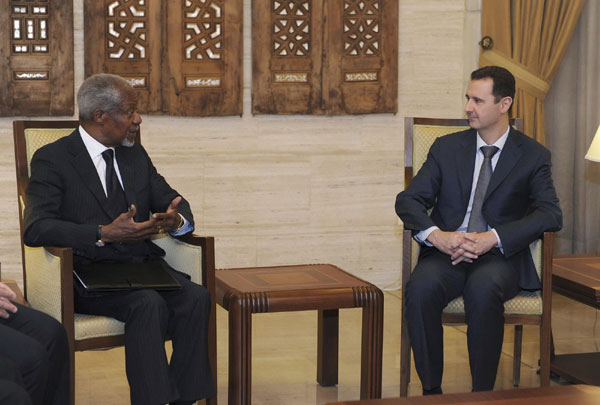
|
 |
|
Syria's President Bashar al-Assad (R) meets UN-Arab League envoy Kofi Annan in Damascus March 10. [Photo\Agencies] |
DAMASCUS - Syrian President Bashar al-Assad reiterated Saturday that any political dialogue is doomed to fail "so long as there are armed groups that work to foment anarchy and destabilize the country," while the opposition placed the blame for the armament of some groups on the government's crackdown.
During his meeting with Kofi Annan, joint special envoy for Syria of the United Nations and Arab League (AL), Assad said that any political dialogue or political process could not succeed so long as there are "armed terrorist groups" working to spread anarchy and destabilize the country through targeting civilians and military personnel and smashing public and private properties.
Assad stressed that Syria is ready to make any "honest" effort to find a solution to the current crisis, adding that "the success of any effort necessitates first a study of what is happening on the ground, instead of depending on visual space circulated by some regional and international states to distort facts and give a diverse picture to what Syria is passing through."
For his part, Annan, who arrived in the Syrian capital of Damascus on Saturday to mediate the year-long crisis, stressed his "commitment to working in a just, evenhanded and independent way," and voiced "rejection of any foreign interference in Syrian affairs" as well as his belief in a peaceful solution.
UN Secretary General Ban Ki-moon said Friday that Annan was scheduled to talk with Assad in Damascus upon arrival, adding that Annan's priority was to immediately halt all fighting between the government forces and opposition fighters -- if not simultaneously, first by the government troops and followed by the opposition.
After meeting the Syrian president, Annan met with some opposition figures in Damascus, mainly Hassan Abdul-Azim, head of the National Coordination Body for the forces of National Democratic Change, who said the Syrian government was responsible for the armament of some groups in Syria, citing the government's alleged crackdown on dissents.
"Some people are obliged to arm themselves due to the continuation of violence," Abdul-Azim said after an hour-long meeting with Annan.
He said there must be a ceasefire and the release of all detainees, adding that there should be a coordination between the AL and the United Nations to solve the crisis in the country.
The crisis in Syria is "complicated and went through dangerous phases," he said, stressing that no solution could be reached in light of violence, murder, arrest and displacement.
"There should be a solution to the crisis because our people are suffering," he said, but made it clear that "there is no horizon for a foreign military intervention."
Before arriving in Syria, Annan said Thursday in Cairo that " ultimately the solution (to Syrian crisis) lies in a political settlement."
"I hope that no one is thinking very seriously of using force in this situation. I believe any further militarization would make the situation worse," he said.
Militarizing the rebels in Syria has recently been put on the table after the broad-based opposition groups such as the Syrian National Council called for rendering military aid to the Free Syrian Army (FSA), an anti-Assad armed rebels, as the sole way to oust Assad.
The FSA has been fighting the government forces in several Syrian provinces, such as the focal point province of Homs and northern Idilb province.
In their latest clashes in al-Hamameh area of Idlib, 14 of the government soldiers were killed, while many of the armed rebels were arrested and their weapons and communication devices were seized, according to the private Sham FM radio.
The report said some other armed groups launched two separate ambushes against the government agents, leaving six of them injured, including a lieutenant, according to the report.
On the opposition side, the Britain-based Syrian Observatory for Human Rights said 16 rebel fighters, seven soldiers and four civilians were killed in the Idlib fighting. It said another 15 people, including three soldiers, were killed in violence elsewhere.
The Syrian government has accused some Arab and Western countries of providing weapons and financial support to the armed groups in Syria. It said in December 2011 that "armed terrorist groups" had killed more than 2,000 army and security personnel during the unrest.
The United Nations said recently that "well over" 7,500 people died in Syria's violence.
A Russian diplomat said Thursday that Assad was battling al- Qaeda-backed militants, including 15,000 foreign fighters who would seize cities if the government troops withdrew.
Addressing a UN humanitarian forum on Syria in Geneva, Russia's deputy ambassador Mikhail Lebedev said rebels had recently committed large-scale attacks against Syrian infrastructure, including schools and hospitals.
"Rebel groups attack, kill, torture and intimidate the civilian population. The flow of all kind of terrorists from some neighboring countries is always increasing," Lebedev said.
Russia, a long-time ally to Assad, has been trying to press for peaceful settlement to the Syrian crisis. Russian Foreign Minister Sergei Lavrov met Saturday with the AL foreign ministers in Cairo and agreed on a formula of five points to resolve the year-long Syrian crisis.
The five-point formula includes putting an end to the violence from all sides, establishing a mechanism for neutral supervision, resisting all foreign intervention, providing the Syrians with humanitarian aid without any obstacle, and supporting strongly Annan's efforts to launch a political dialogue between the Syrian government and the opposition, Lavrov said at a press conference after meeting with the Arab ministers.
The Russian foreign minister also expressed hope that Annan's mission could lead to positive outcomes.
Last month, the United Nations and the AL jointly appointed former UN head Annan as a special envoy to handle the year-long crisis in Syria, and Syria has extended welcome to Annan's visit.